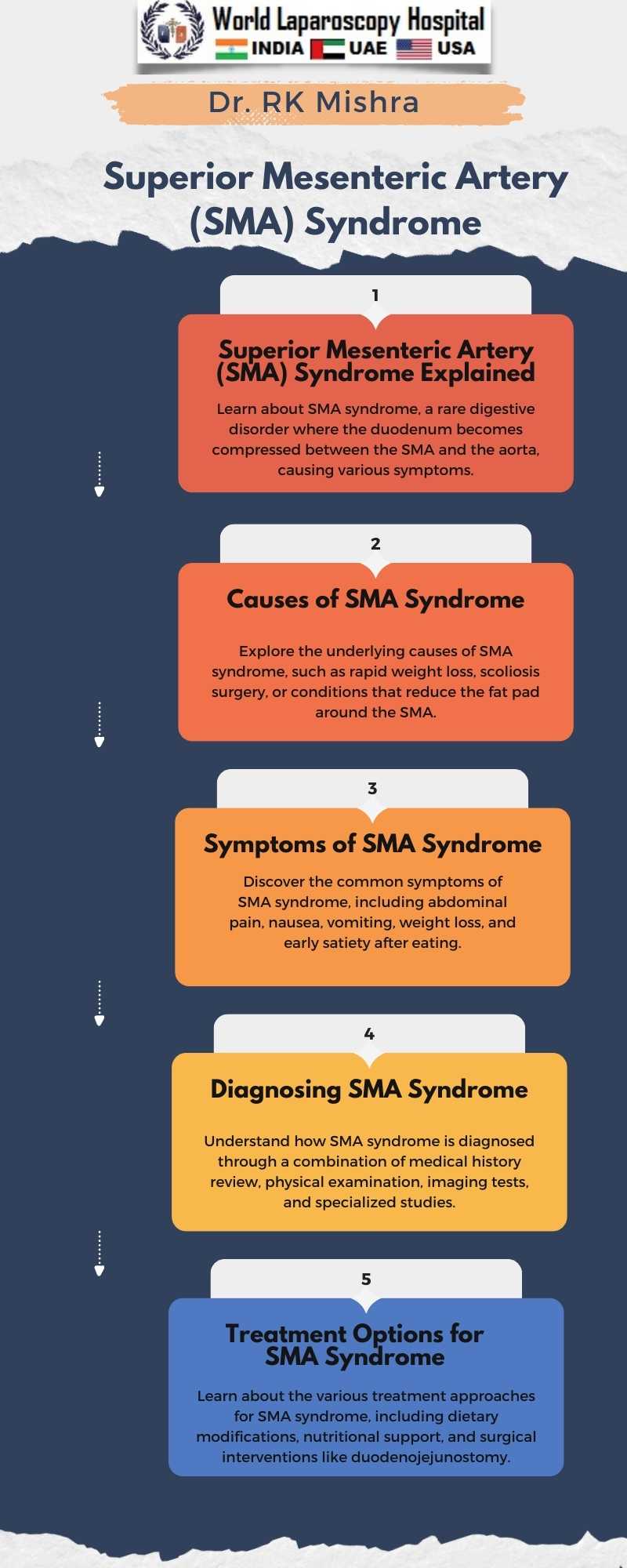Superior Mesenteric Artery (SMA) Syndrome: Duodenal Compression After Rapid Weight Loss Post-Surgery
Title: Superior Mesenteric Artery (SMA) Syndrome: Duodenal Compression After Rapid Weight Loss Post-Surgery
Superior Mesenteric Artery (SMA) Syndrome, also known as Wilkie's syndrome or cast syndrome, is a rare but serious condition characterized by compression of the third portion of the duodenum due to the narrowing of the space between the aorta and the SMA. This compression can lead to a variety of symptoms, including nausea, vomiting, abdominal pain, and weight loss. One of the most common causes of SMA syndrome is rapid weight loss, often seen after surgery or in patients with eating disorders.

SMA syndrome occurs when there is a decrease in the angle between the SMA and the aorta, reducing the space available for the duodenum to pass through. This compression can result in obstruction of the duodenum, leading to symptoms such as abdominal pain after eating, feeling full quickly, and vomiting. In severe cases, it can lead to malnutrition and weight loss.
Rapid weight loss is a common trigger for SMA syndrome. This can occur after surgery, especially procedures that involve significant weight loss, such as bariatric surgery. When a patient loses a large amount of weight in a short period, there is a reduction in the fat pad surrounding the SMA, which can increase the risk of compression of the duodenum. Patients with eating disorders, such as anorexia nervosa, are also at risk due to rapid weight loss.
Diagnosing SMA syndrome can be challenging, as it is a rare condition with symptoms that overlap with other gastrointestinal disorders. Imaging studies such as CT scans or barium studies can help visualize the compression of the duodenum and confirm the diagnosis. Treatment typically involves addressing the underlying cause, such as weight gain or correction of any anatomical abnormalities.
Prevention of SMA syndrome in patients undergoing weight loss surgery involves careful monitoring of weight loss and nutritional status. Gradual weight loss and maintenance of a healthy weight are essential to prevent the reduction of the fat pad around the SMA. In patients with eating disorders, early intervention and treatment are crucial to prevent rapid weight loss and its complications.
Conclusion:
Superior Mesenteric Artery Syndrome is a rare but potentially serious condition that can occur after rapid weight loss, especially post-surgery or in patients with eating disorders. Early recognition and treatment are essential to prevent complications and improve outcomes in affected patients.
Superior Mesenteric Artery (SMA) Syndrome, also known as Wilkie's syndrome or cast syndrome, is a rare but serious condition characterized by compression of the third portion of the duodenum due to the narrowing of the space between the aorta and the SMA. This compression can lead to a variety of symptoms, including nausea, vomiting, abdominal pain, and weight loss. One of the most common causes of SMA syndrome is rapid weight loss, often seen after surgery or in patients with eating disorders.

SMA syndrome occurs when there is a decrease in the angle between the SMA and the aorta, reducing the space available for the duodenum to pass through. This compression can result in obstruction of the duodenum, leading to symptoms such as abdominal pain after eating, feeling full quickly, and vomiting. In severe cases, it can lead to malnutrition and weight loss.
Rapid weight loss is a common trigger for SMA syndrome. This can occur after surgery, especially procedures that involve significant weight loss, such as bariatric surgery. When a patient loses a large amount of weight in a short period, there is a reduction in the fat pad surrounding the SMA, which can increase the risk of compression of the duodenum. Patients with eating disorders, such as anorexia nervosa, are also at risk due to rapid weight loss.
Diagnosing SMA syndrome can be challenging, as it is a rare condition with symptoms that overlap with other gastrointestinal disorders. Imaging studies such as CT scans or barium studies can help visualize the compression of the duodenum and confirm the diagnosis. Treatment typically involves addressing the underlying cause, such as weight gain or correction of any anatomical abnormalities.
Prevention of SMA syndrome in patients undergoing weight loss surgery involves careful monitoring of weight loss and nutritional status. Gradual weight loss and maintenance of a healthy weight are essential to prevent the reduction of the fat pad around the SMA. In patients with eating disorders, early intervention and treatment are crucial to prevent rapid weight loss and its complications.
Conclusion:
Superior Mesenteric Artery Syndrome is a rare but potentially serious condition that can occur after rapid weight loss, especially post-surgery or in patients with eating disorders. Early recognition and treatment are essential to prevent complications and improve outcomes in affected patients.
1 COMMENTS
Dr. Abhishek Sharma
#1
Feb 24th, 2024 7:14 am
Superior Mesenteric Artery Syndrome, rare but serious, often follows rapid weight loss, surgery, or eating disorders. Timely recognition and treatment are crucial to prevent complications and enhance outcomes for affected individuals.
| Older Post | Home | Newer Post |





